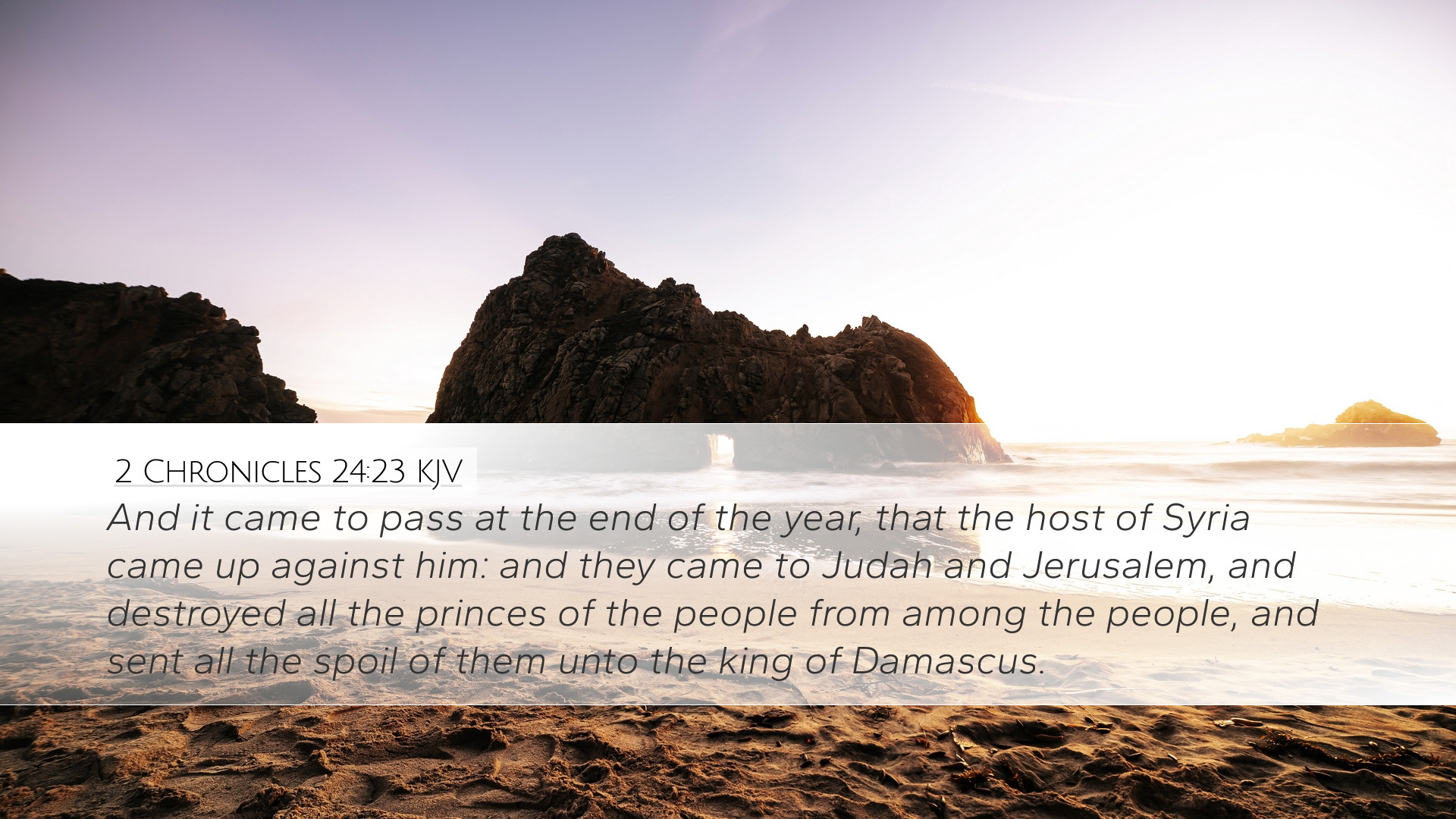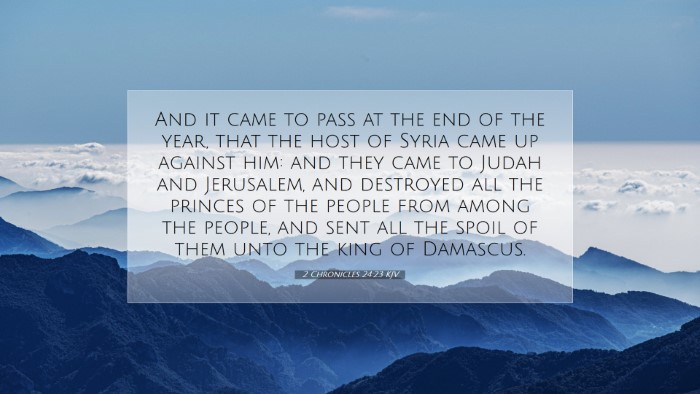Commentary on 2 Chronicles 24:23
Verse Reference: 2 Chronicles 24:23 - "And it came to pass at the end of the year, that the host of Syria came up against him: and they came to Judah and Jerusalem, and destroyed all the princes of the people from among the people, and sent all the spoil of them unto the king of Damascus."
Introduction
The narrative of 2 Chronicles 24:23 captures a critical moment in the history of Judah, marking a divine judgment executed through the military might of Syria. This commentary synthesizes insights from renowned public domain scholars, including Matthew Henry, Albert Barnes, and Adam Clarke, offering profound theological implications and historical context for students, pastors, theologians, and scholars.
Contextual Background
The reign of Joash is central to understanding this verse. As a king initially characterized by reform and restoration, Joash began with a desire to repair the temple and return the people to faithful worship. However, as his reign progressed, he was influenced by outside powers and ultimately strayed from God, leading to severe consequences.
The Role of Joash
- Initial Faithfulness: Joash led religious reforms, following the guidance of Jehoiada the priest. His zeal was evident in restoring the temple worship.
- Downfall: After Jehoiada's death, Joash succumbed to the people’s influences and abandoned the worship of Yahweh, which set the stage for divine retribution.
The Invasion of Syria
This verse highlights a turning point where external forces align against Judah, serving as a divine instrument of judgment. The year in focus marks the culmination of Israel's spiritual decline.
Divine Judgment
- God’s Sovereignty: The invasion is portrayed not just as a military maneuver but as a divine response to Joash’s apostasy.
- Historical Significance: This conflict symbolizes the broader theological principle of divine justice, where nations and leaders face consequences for their actions against God’s commandments.
Interpretations from Public Domain Commentaries
Matthew Henry’s Insights
Matthew Henry’s Commentary emphasizes the correlation between Joash’s unfaithfulness and the ensuing calamity. He notes:
- Assurance of Judgment: "When the leaders forsake God, the nation suffers; He uses even enemies to execute His will."
- Human Agency: The princes destroyed by the Syrians represent the moral decline at the top levels of governance.
Albert Barnes’ Analysis
Albert Barnes offers a more historical examination, linking this invasion to the geopolitical landscape of the Near East:
- Political Dynamics: "Syria’s rise during this period reflects changing powers and a direct challenge to Judah’s sovereignty."
- Judah's Vulnerability: The defeat serves as a reminder of the dependency on divine favor rather than military might.
Adam Clarke’s Commentary
Adam Clarke provides theological reflections regarding the importance of divine favor:
- Spiritual Implications: "This event illustrates that God's protection is withdrawn when the people forsake their covenant relationship."
- Lessons for Leadership: Clarke warns leaders of the necessity to maintain integrity with divine will to avoid calamity.
Theological Reflections
The themes in 2 Chronicles 24:23 prompt a deeper understanding of God's justice and mercy:
- Divine Justice: God's judgment serves a dual purpose: to discipline His people and to demonstrate His sovereignty over all nations.
- Repentance: The call to return to faithfulness is echoed, urging leaders and nations to be vigilant in their covenant with God.
- Role of Providence: This narrative exemplifies how God can use negative circumstances to bring about His intended purposes, highlighting His overarching providence.
Conclusion
In studying 2 Chronicles 24:23, it is crucial for believers of all backgrounds to discern the implications for spiritual leadership and the consequences of turning away from God. The insights from Matthew Henry, Albert Barnes, and Adam Clarke collectively emphasize the relationship between faithfulness to God and national stability. As pastors, theologians, and readers engage with this scripture, they are reminded of the weight of leadership, the certainty of divine justice, and the necessity for continual repentance and spiritual renewal.


